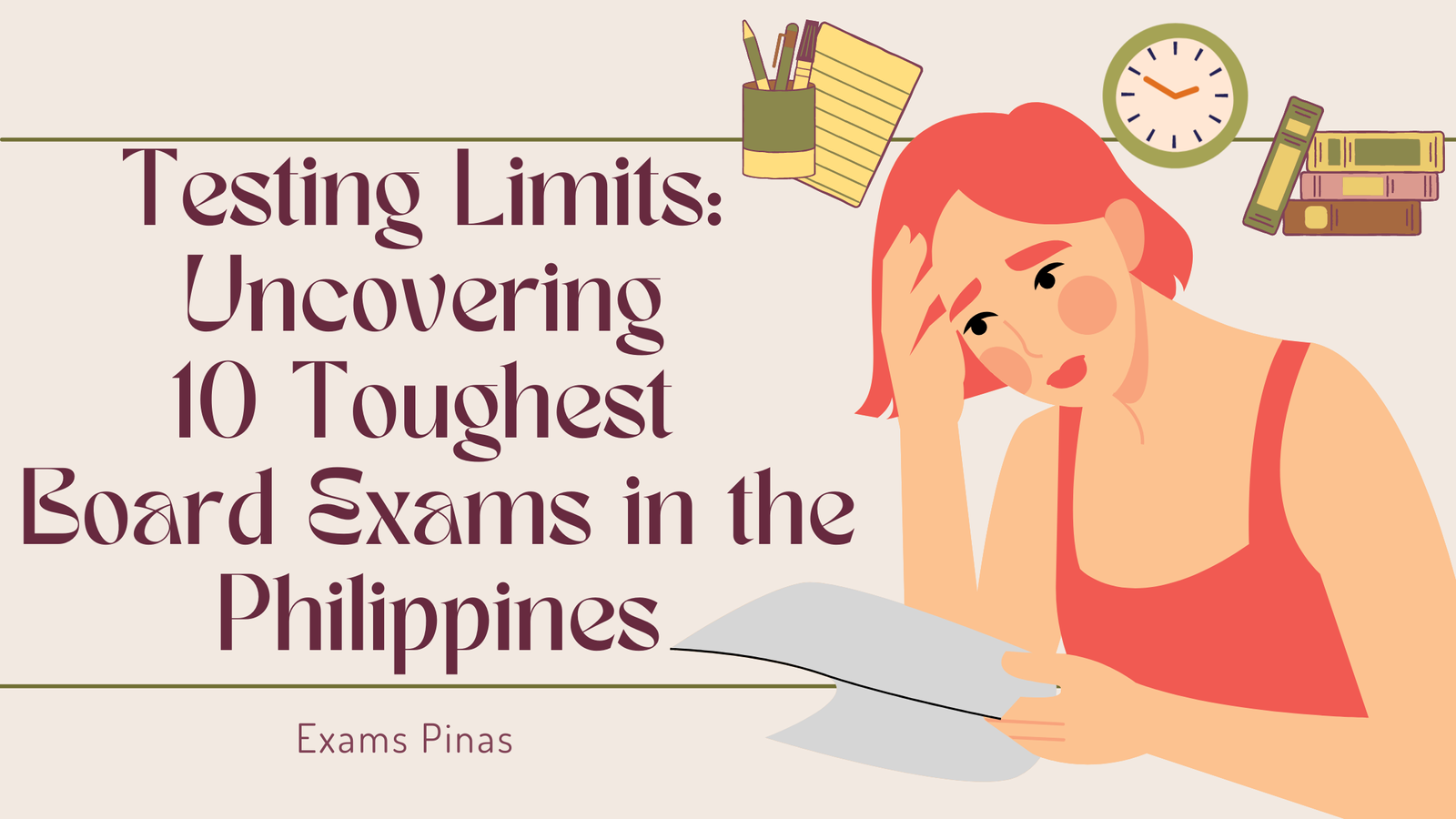Embarking on a professional career requires passing rigorous board exams that test the knowledge, skills, and competence of aspiring professionals. In the Philippines, certain board exams are renowned for their difficulty, challenging candidates to push their limits and strive for excellence. In this blog post, we will uncover the toughest board exams in the Philippines, shedding light on the demanding nature of these examinations and the dedication required to succeed.
- Bar Examination (Law): The Bar examination is widely recognized as one of the most challenging board exams in the Philippines. Aspiring lawyers undergo an intensive assessment of their knowledge in various legal subjects, legal writing skills, and analytical thinking. Passing the Bar exam is a significant achievement, opening doors to the legal profession.
- Physician Licensure Examination (Medicine): The physician licensure examination is known for its comprehensive coverage of medical knowledge, clinical reasoning, and practical skills. Aspiring doctors must demonstrate proficiency in diverse areas such as anatomy, physiology, pharmacology, and medical ethics, making it an arduous journey to obtain a medical license.
- Physical Therapy/Occupational Therapy Board Examination: The board exams for physical therapy and occupational therapy demand a deep understanding of human anatomy, therapeutic techniques, patient management, and rehabilitation principles. Aspiring therapists face a challenging assessment that requires both theoretical knowledge and practical application of their skills.
- Chemical Engineering Board Examination: The chemical engineering board examination evaluates candidates’ competence in complex subjects such as chemical reactions, process calculations, thermodynamics, and plant design. It tests their ability to apply engineering principles to solve real-world challenges in chemical industries.
- Certified Public Accountant (CPA) Licensure Examination (Accountancy): The CPA licensure examination assesses aspiring accountants in various areas, including financial accounting and reporting, management accounting, taxation, auditing, and business laws. The exam demands a deep understanding of accounting principles, analytical skills, and professional ethics.
- Architect Licensure Examination (Architecture): The architecture board examination evaluates candidates’ proficiency in architectural design, building systems, construction methods, architectural history, and professional practice. It tests their ability to integrate creativity, technical knowledge, and architectural principles in designing functional and aesthetically pleasing structures.
- Civil Engineering Board Examination: The civil engineering board examination covers a wide range of subjects, including structural analysis, construction management, geotechnical engineering, transportation engineering, and water resources engineering. Aspiring civil engineers face a comprehensive assessment of their engineering knowledge and problem-solving skills.
- Electrical Engineering Board Examination: The electrical engineering board examination assesses candidates’ understanding of electrical circuits, power systems, electronics, telecommunications, and control systems. It challenges aspiring electrical engineers to demonstrate their competency in designing, analyzing, and troubleshooting complex electrical systems.
- Mechanical Engineering Board Examination: The mechanical engineering board examination covers diverse areas such as thermodynamics, fluid mechanics, heat transfer, machine design, and materials engineering. Aspiring mechanical engineers face a comprehensive assessment that tests their understanding of fundamental principles and their ability to apply them to solve engineering problems.
- Pharmacy Board Examination: The pharmacy board examination evaluates candidates’ knowledge in pharmaceutical sciences, pharmacology, pharmaceutical calculations, pharmacy practice, and pharmaceutical laws. Aspiring pharmacists face a rigorous assessment that requires a deep understanding of medications, patient care, and ethical pharmacy practices.
The toughest board exams in the Philippines demand unwavering dedication, relentless perseverance, and a commitment to intellectual excellence. These examinations serve as the gateway to prestigious professional careers and require individuals to continually enhance their knowledge and skills. By conquering these challenges, aspiring professionals demonstrate their ability to push their limits, contribute to their respective fields, and embark on rewarding journeys that make a lasting impact. The journey may be arduous, but the rewards are immeasurable, leading to fulfilling careers that shape the future of industries and positively impact society as a whole.

